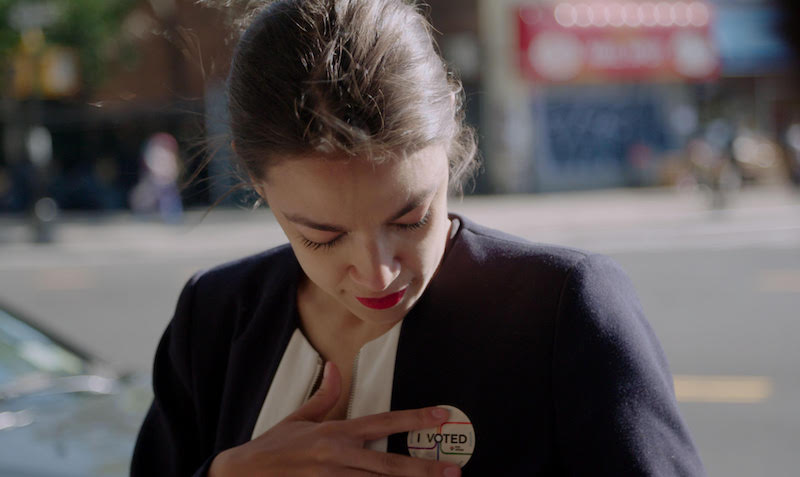Ocasio-Cortez Came to ‘Knock Down the House’
Filmmakers Rachel Lears and Robin Blotnick were there for all of it; their new documentary follows an ascendant AOC and three other women. She voted: Alexandria Ocasio-Cortez sports a commemorative pin on Election Day, Nov. 6, 2018. (Netflix)
She voted: Alexandria Ocasio-Cortez sports a commemorative pin on Election Day, Nov. 6, 2018. (Netflix)
The day after the 2016 presidential election, filmmaker Rachel Lears woke up in her Brooklyn apartment feeling hopeless. The only way out of her funk was to take action, which she did by embarking on the making of a documentary about four grassroots candidates, each with limited experience and resources, running for House seats in the 2018 midterms. Among the surprise winners, as we all know now, was a bartender from the Bronx named Alexandria Ocasio-Cortez, who gave Lears an intimate look at her campaign. The end result is the new documentary “Knock Down the House,” opening Wednesday in select theaters and on Netflix.
“The concept of the film was always [that] it’s not that our democracy is something that exists and works and we have to have faith in it, but precisely that the system doesn’t work and we have to change it,” Lears said in an interview. “As Alexandria says in one of the rallies in the film, we have to rise to the promise, the promise that everyone can be part of the democratic process. And I think that’s what these campaigns are doing.”
The search for candidates led Lears and her husband, writer-editor Robin Blotnick, to two political action committees Lears spotted on the pages of The Nation: Justice Democrats and Brand New Congress. From there, the filmmaking pair narrowed their scope to focus on grassroots candidates who had pledged not to take any corporate money and who were united on social democratic principles across racial and geographical barriers. By covering the nascent stages of a seismic shift to come months later in the midterms, Lears captured what no filmmaker had before her. Yes, campaigns have been the subjects of many prior films—but not campaigns involving everyday people bouncing back from personal loss or tragedy to seize control of their lives and political destinies. The four women Lears featured—Ocasio-Cortez, Amy Vilela, Cori Bush and Paula Jean Swearengin—persisted despite overwhelming odds. As a result, “Knock Down the House” achieves the impossible by actually humanizing political candidates.
As a child growing up in a working-class neighborhood in the Bronx, Ocasio-Cortez, or AOC, as she is widely known, commuted 40 minutes to public school in the suburbs. At Boston University, she majored in economics and international relations, graduating cum laude. In 2008, during her second year of college, her father died of lung cancer at the age of 48. During the height of the recession, the family was freighted with emotional as well as economic tragedy. To keep from losing their home, AOC worked two jobs and took on 18-hour shifts in restaurants. In 2016, she toured the country working for Sen. Bernie Sanders’ presidential campaign before getting a call from Brand New Congress, a PAC formed by former Sanders staffers.
“What might surprise a lot of people is that she does come from humble roots, which seems to shock people on the right,” Blotnick said. “I hope the film will just give people a sense of her as a human being.” In the movie, AOC is shown handing out leaflets and greeting voters, listening to their concerns and occasionally fretting with her partner about taking on a Democratic machine candidate like Joe Crowley, an opponent so solid he’s considered a future speaker of the House.
She’s not expected to win. Neither is Vilela, running in Nevada’s Fourth District. Vilela, too, was spurred on by tragedy when her 22-year-old daughter suffered a pulmonary embolism and died because hospital staff refused treatment without proof of insurance. She is shown going door to door and working with tireless young volunteers who seem hopeful beyond reason.
We also meet Bush, from St. Louis, a pastor and nurse who volunteered her service during the Ferguson, Mo., uprising. Her opponent in Missouri’s First District is Lacy Clay, whose family roots in politics go back generations.
“No American should have to beg for something so simple as a clean glass of water,” Swearengin says as she points out all the homes that have been affected by cancer deaths in a West Virginia mountain valley ravaged by coal mining. “If another country came here and blew up our mountain and poisoned our water, we’d go to war.” And so she does, taking on incumbent Sen. Joe Manchin, a staunch defender of the fossil fuel industry. Yes, she’s from a long line of miners, but she cannot ignore the fact that cancer deaths in West Virginia rank third-highest in the nation.
Throughout the filmmaking process, there were, of course, no guarantees that the candidates Lears and Blotnick chose to follow would win. In fact, the filmmakers had every reason to believe they would all lose. It’s no spoiler to say that some do and some don’t, but there was no way Lears and Blotnick could have guessed that AOC would become the star she has.
Since taking office in a historic midterm election that brought a record number of women, people of color and progressives to the chamber, Ocasio-Cortez’s signature cause has become the Green New Deal. While the proposed legislation has been embraced by presidential candidates Cory Booker, Kirsten Gillibrand, Kamala Harris, Amy Klobuchar and Elizabeth Warren, centrist Democrats like Dianne Feinstein and Nancy Pelosi, as well as many on the right, have questioned the economics behind it.
“It’s about priorities and it’s about the fact that the country has found the money for things that matter. When the government says military expenditures and bank bailouts are priorities, then that will get funded,” noted Lears, adding some choice words for Pelosi and other members of the Democratic Party. “I think she’s threatened, and I think the whole idea that it’s possible to run congressional campaigns without corporate funding scares a lot of people in the political establishment.”
If AOC represents a left-flank challenge to Pelosi, she represents a Bolshevik uprising to the right, which see her race, gender and ideology as a triple threat. “So much of the commentary is just dismissive and misogynist,” Lears said. “They’re scared of the power she brings to the left, and it’s all of those things—the ideology and her identity, the policy positions and what she represents.”
Running throughout the film—which scored Audience and Festival Favorite Award wins at January’s Sundance Film Festival—as well as through the campaigns it covers is a current of optimism against daunting odds. And while it’s clear that not all those odds will be beaten, Ocasio-Cortez observes before her victory that “for one of us to make it through, a hundred of us have to try.” While enthusiasm is to be encouraged, it can seem hopeless in the wake of collapsing checks and balances and in a time of wanton disregard for the rule of law on the part of government officials.
“We’re living in this historical moment where the policy positions that are considered leftist are also populist and are actually broadly popular among both parties when you do the polling,” said Lears, pointing to Medicare-for-all, the Green New Deal, insurgent candidates and concerns over money in politics as common ground. “The ideological axis in this country—it’s not just the spectrum of left or right. I think the up/down axis is really interesting.”
Blotnick added, “We find hope in people mobilizing to take power. It’s not the system or the set of rules that are going to save us. I think it’s people banding together around common interests and pursuing a better future.”
Your support is crucial…With an uncertain future and a new administration casting doubt on press freedoms, the danger is clear: The truth is at risk.
Now is the time to give. Your tax-deductible support allows us to dig deeper, delivering fearless investigative reporting and analysis that exposes what’s really happening — without compromise.
Stand with our courageous journalists. Donate today to protect a free press, uphold democracy and unearth untold stories.









You need to be a supporter to comment.
There are currently no responses to this article.
Be the first to respond.